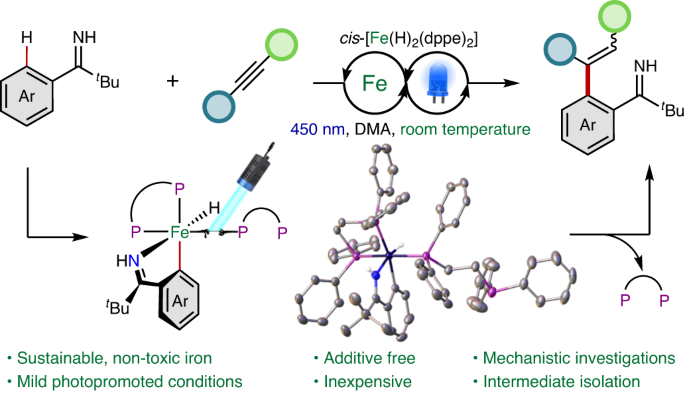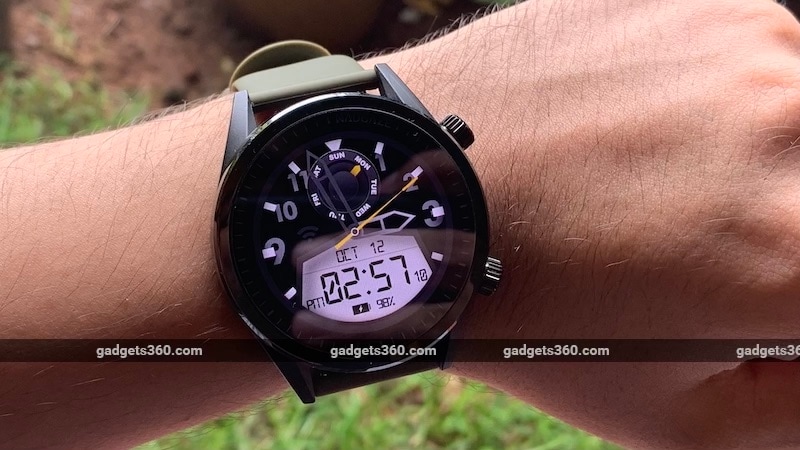
- Select a language for the TTS:
- UK English Female
- UK English Male
- US English Female
- US English Male
- Australian Female
- Australian Male
- Language selected: (auto detect) - EN
Play all audios:
ABSTRACT Iron is inexpensive, non-toxic and the most abundant transition metal in the Earth’s crust, rendering iron-catalysed C–H activations attractive yet particularly challenging. Despite
major advances, iron-catalysed C–H activations have been linked to high reaction temperatures or the use of reactive Grignard reagents. Here we present iron-catalysed ketimine C–H
activations at ambient reaction temperature with the help of blue light in the absence of additives, utilizing easily accessible _cis_-[Fe(H)2(dppe)2] (where dppe is
1,2-bis(diphenylphosphino)ethane) as a single component precatalyst. Mild reaction conditions, high atom economy and the lack of Grignard reagents are distinguishing features of the
iron-catalysed C–H alkenylation manifold. Detailed mechanistic investigations by deuterium labelling, isolation of organometallic intermediates and in operando light-emitting diode nuclear
magnetic resonance spectroscopy revealed the role of the light and an oxidative addition to an iron(0) complex as the modus operandi for the C–H activation. Access through your institution
Buy or subscribe This is a preview of subscription content, access via your institution ACCESS OPTIONS Access through your institution Access Nature and 54 other Nature Portfolio journals
Get Nature+, our best-value online-access subscription $29.99 / 30 days cancel any time Learn more Subscribe to this journal Receive 12 digital issues and online access to articles $119.00
per year only $9.92 per issue Learn more Buy this article * Purchase on SpringerLink * Instant access to full article PDF Buy now Prices may be subject to local taxes which are calculated
during checkout ADDITIONAL ACCESS OPTIONS: * Log in * Learn about institutional subscriptions * Read our FAQs * Contact customer support SIMILAR CONTENT BEING VIEWED BY OTHERS IRON-CATALYSED
C(_SP_²)–H ACTIVATION FOR AZA-ANNULATION WITH ALKYNES ON EXTENDED _Π_-CONJUGATED SYSTEMS Article 09 July 2024 PHOTOCHEMICAL DIAZIDATION OF ALKENES ENABLED BY LIGAND-TO-METAL CHARGE TRANSFER
AND RADICAL LIGAND TRANSFER Article Open access 23 December 2022 BIFUNCTIONAL IRON-CATALYZED ALKYNE _Z_-SELECTIVE HYDROALKYLATION AND TANDEM _Z_-_E_ INVERSION VIA RADICAL MOLDING AND
FLIPPING Article Open access 04 October 2024 DATA AVAILABILITY The data supporting the findings of this study are available within the article and its Supplementary Information, or from the
authors on reasonable request. Crystal structure data have been deposited at the Cambridge Crystallographic Data Centre (CCDC nos. 2192211–2192227 and 2280102–2280104), and crystallographic
data are provided in Supplementary Information. These data can be obtained free of charge from The Cambridge Crystallographic Data Centre via www.ccdc.cam.ac.uk. Spectroscopic and kinetic
data that support the findings of this study are freely available in Zenodo data repository, with https://doi.org/10.5281/zenodo.10138296. REFERENCES * Rogge, T. et al. C–H activation. _Nat.
Rev. Methods Prim._ 1, 1–31 (2021). Google Scholar * Ackermann, L. Carboxylate-assisted transition metal-catalyzed C–H bond functionalizations: mechanism and scope. _Chem. Rev._ 111,
1315–1345 (2011). * Colby, D. A., Tsai, A. S., Bergman, R. G. & Ellman, J. A. Rhodium-catalyzed chelation-assisted C–H bond functionalization reactions. _Acc. Chem. Res._ 45, 814–825
(2012). * Arockiam, P. B., Bruneau, C. & Dixneuf, P. H. Ruthenium(II)-catalyzed C–H bond activation and functionalization. _Chem. Rev._ 112, 5879–5918 (2012). CAS Google Scholar *
Davies, H. M. L. & Morton, D. Collective approach to advancing C–H functionalization. _ACS Cent. Sci._ 3, 936–943 (2017). CAS PubMed Central Google Scholar * Gensch, T., Hopkinson, M.
N., Glorius, F. & Wencel-Delord, J. Mild metal-catalyzed C–H activation: examples and concepts. _Chem. Soc. Rev._ 45, 2900–2936 (2016). CAS Google Scholar * Park, Y., Kim, Y. &
Chang, S. Transition metal-catalyzed C–H amination: scope, mechanism, and applications. _Chem. Rev._ 117, 9247–9301 (2017). CAS Google Scholar * Rej, S., Ano, Y. & Chatani, N.
Bidentate directing groups: an efficient tool in C–H bond functionalization chemistry for the expedient construction of C–C bonds. _Chem. Rev._ 120, 1788–1887 (2020). CAS Google Scholar *
Sun, C.-L., Li, B.-J. & Shi, Z.-J. Direct C–H transformation via iron catalysis. _Chem. Rev._ 111, 1293–1314 (2010). Google Scholar * Satoh, T. & Miura, M. Transition
metal-catalyzed regioselective arylation and vinylation of carboxylic acids. _Synthesis_ 2010, 3395–3409 (2010). * Manan, R. S. & Zhao, P. Merging rhodium-catalysed C–H activation and
hydroamination in a highly selective [4+2] imine/alkyne annulation. _Nat. Commun._ 7, 11506 (2016). PubMed Central Google Scholar * Colby, D. A., Bergman, R. G. & Ellman, J. A.
Rhodium-catalyzed C–C bond formation via heteroatom-directed C–H bond activation. _Chem. Rev._ 110, 624–655 (2010). CAS PubMed Central Google Scholar * Gao, K., Lee, P.-S., Fujita, T.
& Yoshikai, N. Cobalt-catalyzed hydroarylation of alkynes through chelation-assisted C–H bond activation. _J. Am. Chem. Soc._ 132, 12249–12251 (2010). CAS Google Scholar * Lee, P.-S.,
Fujita, T. & Yoshikai, N. Cobalt-catalyzed room-temperature addition of aromatic imines to alkynes via directed C–H bond activation. _J. Am. Chem. Soc._ 133, 17283–17295 (2011). *
Fallon, B. J. et al. C–H activation/functionalization catalyzed by simple, well-defined low-valent cobalt complexes. _J. Am. Chem. Soc._ 137, 2448–2451 (2015). CAS Google Scholar *
Gandeepan, P. et al. 3_d_ transition metals for C–H activation. _Chem. Rev._ 119, 2192–2452 (2019). CAS Google Scholar * Yoshino, T. & Matsunaga, S. Cobalt-catalyzed C(sp3)–H
functionalization reactions. _Asian J. Org. Chem._ 7, 1193–1205 (2018). CAS Google Scholar * Nakao, Y. Hydroarylation of alkynes catalyzed by nickel. _Chem. Rec._ 11, 242–251 (2011). CAS
Google Scholar * Khake, S. M. & Chatani, N. Nickel-catalyzed C–H functionalization using a non-directed strategy. _Chem_ 6, 1056–1081 (2020). CAS Google Scholar * Liu, Y.-H., Xia,
Y.-N. & Shi, B.-F. Ni-catalyzed chelation-assisted direct functionalization of inert C–H bonds. _Chin. J. Chem._ 38, 635–662 (2020). CAS Google Scholar * Hirano, K. & Miura, M.
Recent advances in copper-mediated direct biaryl coupling. _Chem. Lett._ 44, 868–873 (2015). CAS Google Scholar * Shang, R., Ilies, L. & Nakamura, E. Iron-catalyzed C–H bond
activation. _Chem. Rev._ 117, 9086–9139 (2017). CAS PubMed Google Scholar * Cera, G. & Ackermann, L. Iron-catalyzed C–H functionalization processes. _Top. Curr. Chem._ 374, 57 (2016).
Google Scholar * Jia, T., Zhao, C., He, R., Chen, H. & Wang, C. Iron-carbonyl-catalyzed redox-neutral [4+2] annulation of N–H imines and internal alkynes by C–H bond activation.
_Angew. Chem. Int. Ed._ 55, 5268–5271 (2016). CAS Google Scholar * Kimura, N., Kochi, T. & Kakiuchi, F. Iron-catalyzed regioselective anti-Markovnikov addition of C–H bonds in aromatic
ketones to alkenes. _J. Am. Chem. Soc._ 139, 14849–14852 (2017). CAS PubMed Google Scholar * Kimura, N., Kochi, T. & Kakiuchi, F. Iron‐catalyzed _ortho_‐selective C−H alkylation of
aromatic ketones with _N_‐alkenylindoles and partial indolylation via 1,4‐iron migration. _Asian J. Org. Chem._ 8, 1115–1117 (2019). CAS Google Scholar * Messinis, A. M., Finger, L. H.,
Hu, L. & Ackermann, L. Allenes for versatile iron-catalyzed C–H activation by weak _O_-coordination: mechanistic insights by kinetics, intermediate isolation, and computation. _J. Am.
Chem. Soc._ 142, 13102–13111 (2020). CAS Google Scholar * Messinis, A. M., Oliveira, J. C. A., Stückl, A. C. & Ackermann, L. Cyclometallated iron(II) alkoxides in iron-catalyzed C–H
activations by weak _O_-carbonyl chelation. _ACS Catal._ 12, 4947–4960 (2022). CAS Google Scholar * Kimura, N., Katta, S., Kitazawa, Y., Kochi, T. & Kakiuchi, F. Iron-catalyzed _ortho_
C–H homoallylation of aromatic ketones with methylenecyclopropanes. _J. Am. Chem. Soc._ 143, 4543–4549 (2021). CAS Google Scholar * Twilton, J. et al. The merger of transition metal and
photocatalysis. _Nat. Rev. Chem_. 1, 0052 (2017). * Wang, C.-S., Dixneuf, P. H. & Soulé, J.-F. Photoredox catalysis for building C–C bonds from C(sp2)–H bonds. _Chem. Rev._ 118,
7532–7585 (2018). CAS Google Scholar * Guillemard, L. & Wencel-Delord, J. When metal-catalyzed C–H functionalization meets visible-light photocatalysis. _Beilstein J. Org. Chem._ 16,
1754–1804 (2020). CAS PubMed Central Google Scholar * Mendelsohn, L. N. et al. Visible-light-enhanced cobalt-catalyzed hydrogenation: switchable catalysis enabled by divergence between
thermal and photochemical pathways. _ACS Catal._ 11, 1351–1360 (2021). CAS Google Scholar * Cuthbertson, J. D. & Macmillan, D. W. C. The direct arylation of allylic sp3 C–H bonds via
organic and photoredox catalysis. _Nature_ 519, 74–77 (2015). CAS PubMed Central Google Scholar * Kalyani, D., Mcmurtrey, K. B., Neufeldt, S. R. & Sanford, M. S. Room temperature C–H
arylation: merger of Pd-catalyzed C–H functionalization and visible-light photocatalysis. _J. Am. Chem. Soc._ 133, 18566–18569 (2011). CAS PubMed Central Google Scholar * Shaw, M. H.,
Shurtleff, V. W., Terrett, J. A., Cuthbertson, J. D. & MacMillan, D. W. C. Native functionality in triple catalytic cross-coupling: sp3 C–H bonds as latent nucleophiles. _Science_ 352,
1304–1308 (2016). CAS PubMed Central Google Scholar * Wegeberg, C. & Wenger, O. S. Luminescent first-row transition metal complexes. _JACS Au_ 1, 1860–1876 (2021). CAS PubMed Central
Google Scholar * Stephenson, C. R. J., Yoon, T. & MacMillan, D. W. C. _Visible Light Photocatalysis in Organic Chemistry_ (Wiley, 2018). * Dombray, T. et al. Iron-catalyzed C–H
borylation of arenes. _J. Am. Chem. Soc._ 137, 4062–4065 (2015). CAS Google Scholar * Zhou, W. J. et al. Light runs across iron catalysts in organic transformations. _Chem. Eur. J._ 26,
15052–15064 (2020). CAS PubMed Google Scholar * Bautista, M. T., Bynum, L. D. & Schauer, C. K. Synthesis of η2-dihydrogen complex,
_trans_-{Fe(η2-H2)(H)[1,2-bis(diphenylphosphino)-ethane]2}[BF4]: an experiment for an advanced inorganic chemistry laboratory involving synthesis and NMR properties of an η2-H2 complex. _J.
Chem. Educ._ 73, 988 (1996). * Azizian, H. & Morris, R. H. Photochemical synthesis and reactions of FeH(C6H4PPhCH2CH2PPh2)(PPh2PCH2CH2PPh2). _Inorg. Chem._ 22, 6–9 (1983). CAS Google
Scholar * Lehnherr, D. et al. Discovery of a photoinduced dark catalytic cycle using in situ LED-NMR spectroscopy. _J. Am. Chem. Soc._ 140, 13843–13853 (2018). CAS PubMed Google Scholar
* Hoye, T. R., Eklov, B. M., Ryba, T. D., Voloshin, M. & Yao, L. J. No-D NMR (no-deuterium proton NMR) spectroscopy: a simple yet powerful method for analyzing reaction and reagent
solutions. _Org. Lett._ 6, 953–956 (2004). CAS PubMed Google Scholar * Suslick, B. A. & Tilley, T. D. Mechanistic interrogation of alkyne hydroarylations catalyzed by highly reduced
single-component cobalt complexes. _J. Am. Chem. Soc._ 142, 11203–11218 (2020). * Frohnapfel, D. S. & Templeton, J. L. Transition metal η2-vinyl complexes. _Coord. Chem. Rev._ 206–207,
199–235 (2000). * Goumans, T. P. M. et al. Photodissociation of the phosphine-substituted transition metal carbonyl complexes Cr(CO)5L and Fe(CO)4L: a theoretical study. _J. Am. Chem. Soc._
125, 3558–3567 (2003). CAS PubMed Google Scholar * Salassa, L., Garino, C., Salassa, G., Gobetto, R. & Nervi, C. Mechanism of ligand photodissociation in photoactivable [Ru(bpy)2L2]2+
complexes: a density functional theory study. _J. Am. Chem. Soc._ 130, 9590–9597 (2008). CAS PubMed Google Scholar * Casitas, A., Krause, H., Goddard, R. & Fürstner, A. Elementary
steps of iron catalysis: exploring the links between iron-alkyl and iron-olefin complexes for their relevance in C–H activation and C–C bond formation. _Angew. Chem. Int. Ed._ 54, 1521–1526
(2015). * Yu, C., Zhang, W.-X. & Xi, Z. Cyclobutadiene sandwich complexes of nickel and iron from cyclization of 1,3-butadiene dianions: synthesis and structural characterization.
_Organometallics_ 37, 4100–4104 (2018). CAS Google Scholar * Aranyos, A. et al. Novel electron-rich bulky phosphine ligands facilitate the palladium-catalyzed preparation of diaryl ethers.
_J. Am. Chem. Soc._ 121, 4369–4378 (1999). CAS Google Scholar Download references ACKNOWLEDGEMENTS Generous support by the DFG (SPP 1807 Gottfried-Wilhelm-Leibniz award to L.A.), the
European Union’s Horizon 2020 research and innovation programme (Marie Skłodowska-Curie grant agreement no. 895404 to A.M.M. and ERC advanced grant agreement no. 101021358 to L.A.) and FCI
Kekulé Fellowship no. 110091 (T.v.M.) is gratefully acknowledged. We thank C. Golz (Göttingen University) for assistance with the X-ray diffraction analysis and I. Maksso for measuring
inductively coupled plasma mass spectrometry solutions. AUTHOR INFORMATION AUTHORS AND AFFILIATIONS * Institut für Organische und Biomolekulare Chemie, Georg-August-Universität Göttingen,
Göttingen, Germany Antonis M. Messinis, Tristan von Münchow, Max Surke & Lutz Ackermann * Wöhler-Research Institute for Sustainable Chemistry, Georg-August-Universität Göttingen,
Göttingen, Germany Antonis M. Messinis, Tristan von Münchow & Lutz Ackermann Authors * Antonis M. Messinis View author publications You can also search for this author inPubMed Google
Scholar * Tristan von Münchow View author publications You can also search for this author inPubMed Google Scholar * Max Surke View author publications You can also search for this author
inPubMed Google Scholar * Lutz Ackermann View author publications You can also search for this author inPubMed Google Scholar CONTRIBUTIONS A.M.M. unravelled the photo-promoted
iron-catalysed C–H activation of imines, conducted the mechanistic studies, explored the substrate scope assisted by T.v.M. and M.S., and wrote the paper with revisions provided by the other
authors. M.S. performed the Grignard studies. L.A. conceived and directed the research programme and revised the paper. CORRESPONDING AUTHOR Correspondence to Lutz Ackermann. ETHICS
DECLARATIONS COMPETING INTERESTS The authors declare no competing interests. PEER REVIEW PEER REVIEW INFORMATION _Nature Catalysis_ thanks Brian Patrick and the other, anonymous, reviewer(s)
for their contribution to the peer review of this work. ADDITIONAL INFORMATION PUBLISHER’S NOTE Springer Nature remains neutral with regard to jurisdictional claims in published maps and
institutional affiliations. SUPPLEMENTARY INFORMATION SUPPLEMENTARY INFORMATION Supplementary Methods, Figs. 1–52, Tables 1–6 and References. SUPPLEMENTARY DATA 1 CIF file of the crystal
structure of compound 4A. SUPPLEMENTARY DATA 2 CIF file of the crystal structure of compound 4B. SUPPLEMENTARY DATA 3 CIF file of the crystal structure of compound 4C. SUPPLEMENTARY DATA 4
CIF file of the crystal structure of compound 4D. SUPPLEMENTARY DATA 5 CIF file of the crystal structure of compound 4E. SUPPLEMENTARY DATA 6 CIF file of the crystal structure of compound
4F. SUPPLEMENTARY DATA 7 CIF file of the crystal structure of compound 4G. SUPPLEMENTARY DATA 8 CIF file of the crystal structure of compound 5A. SUPPLEMENTARY DATA 9 CIF file of the crystal
structure of compound 5B. SUPPLEMENTARY DATA 10 CIF file of the crystal structure of compound 5C. SUPPLEMENTARY DATA 11 CIF file of the crystal structure of compound 6A. SUPPLEMENTARY DATA
12 CIF file of the crystal structure of compound 6B. SUPPLEMENTARY DATA 13 CIF file of the crystal structure of compound 6C. SUPPLEMENTARY DATA 14 CIF file of the crystal structure of
compound 8. SUPPLEMENTARY DATA 15 CIF file of the crystal structure of compound 10A. SUPPLEMENTARY DATA 16 CIF file of the crystal structure of compound 10B. SUPPLEMENTARY DATA 17 CIF file
of the crystal structure of compound _E_-3AA. SUPPLEMENTARY DATA 18 CIF file of the crystal structure of compound _E_-3AA″. SUPPLEMENTARY DATA 19 CIF file of the crystal structure of
compound _E_-3AJ. SUPPLEMENTARY DATA 20 CIF file of the crystal structure of compound _Z_-3EA. RIGHTS AND PERMISSIONS Springer Nature or its licensor (e.g. a society or other partner) holds
exclusive rights to this article under a publishing agreement with the author(s) or other rightsholder(s); author self-archiving of the accepted manuscript version of this article is solely
governed by the terms of such publishing agreement and applicable law. Reprints and permissions ABOUT THIS ARTICLE CITE THIS ARTICLE Messinis, A.M., von Münchow, T., Surke, M. _et al._ Room
temperature photo-promoted iron-catalysed arene C–H alkenylation without Grignard reagents. _Nat Catal_ 7, 273–284 (2024). https://doi.org/10.1038/s41929-023-01105-0 Download citation *
Received: 07 January 2023 * Accepted: 21 December 2023 * Published: 13 February 2024 * Issue Date: March 2024 * DOI: https://doi.org/10.1038/s41929-023-01105-0 SHARE THIS ARTICLE Anyone you
share the following link with will be able to read this content: Get shareable link Sorry, a shareable link is not currently available for this article. Copy to clipboard Provided by the
Springer Nature SharedIt content-sharing initiative








